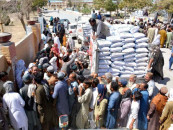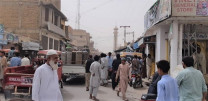Drug shortage spurs research
Meglumine antimoniate is not produced locally

Experts in medicine, entomology, dermatology and zoology are raising voices for holding clinical trials to find out alternate treatment for Cutaneous Leishminiasis (CL), an overlooked skin ailment of tropical region emerging as third most important vector borne disease after malaria and dengue.
The concern by experts has been exhibited in wake of the limited cure options due to complete reliance on Meglumine antimonite, a decades old imported drug used as first line treatment for cutaneous leishminiasis requiring injections for 21 to 30 consecutive days.
Meglumine antimoniate is not produced locally and health authorities completely rely on its procurement through imports by international organisations such as the World Health Organization, making it difficult to properly treat this parasitic disease widening its horizon from endemic to non-endemic regions due to rapid urbanization, climate change and large scale dispersion of population,” they explained.
In many areas the doses each patient receives are insufficient, because of the drug’s limited availability and lack of suitably trained medical staff.
Recent reports regarding exhaustion of glucantime vials stock in Khyber Pakhtunkhwa gave impetus to experts’ call. “The bulky stock of 180,000 jabs imported by Health Department of K-P through WHO in 2018 after the outbreak of cutaneous leishminiasis in the province, has been finished in December 2023 and we are currently short of medicine to treat the patients,” disclosed Salauddin Marwat, entomologist at Integrated Vector Control Programme K-P.
Due to lack of first line medicine, doctors are opting for alternate treatment procedures including cryotherapy, applying minor volumes of liquid nitrogen at -196C to affected portion of skin once or twice on weekly basis up to six weeks and Thermotherapy, applying heat at the scar.
The Integrated Vector Control Programme has supplied equipment for both the therapies in some leishminiasis hotspot of K-P including Dera Ismail Khan, Mohmand and Karak for treatment.
While for proper treatment through glucantime injections, patients are visiting centers established by Medicines Sans Frontier (MSF), an international medical humanitarian organization, in Khyber Pakhtukhwa, Salauddin told APP.
“After analyzing data of Public Health Department indicating sharp increase in Leishminaiasis infection in the region and its impact on physical and mental health of patients, its time for DRAP, to take measures for availability of a proper, latest, effective and affordable medicine for its treatment,” suggested Dr Rafiq Hayat Malezai, DHO Mohmand District, a hotspot of Leishmaniasis registering around 5,283 cases in 2023.
Published in The Express Tribune, March 19th, 2024.












1724319076-0/Untitled-design-(5)1724319076-0-208x130.webp)






COMMENTS
Comments are moderated and generally will be posted if they are on-topic and not abusive.
For more information, please see our Comments FAQ